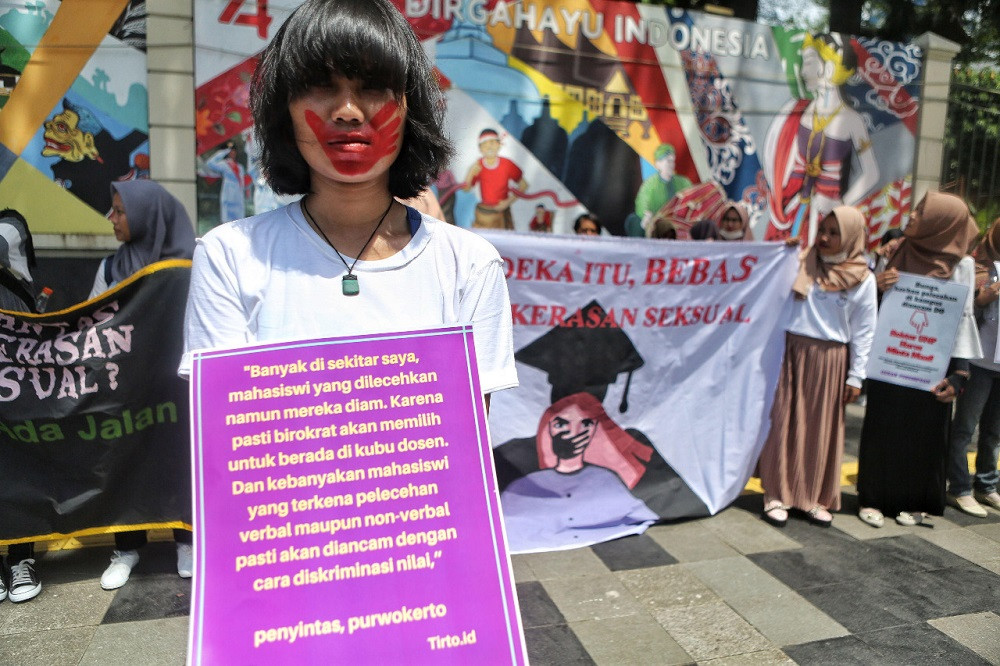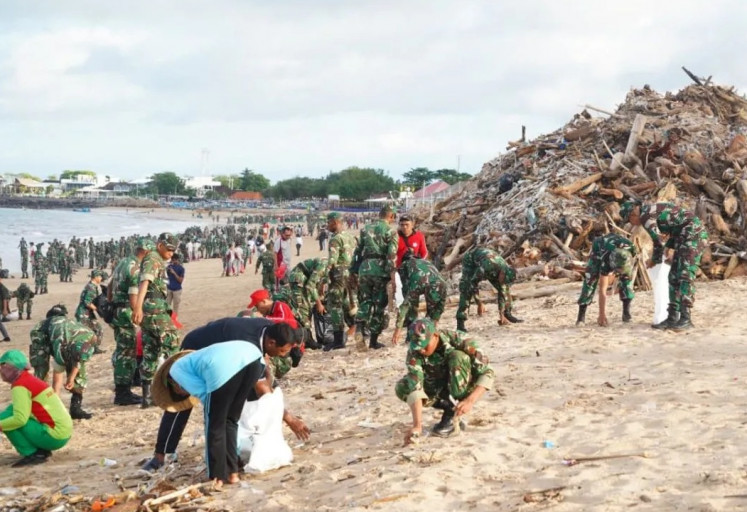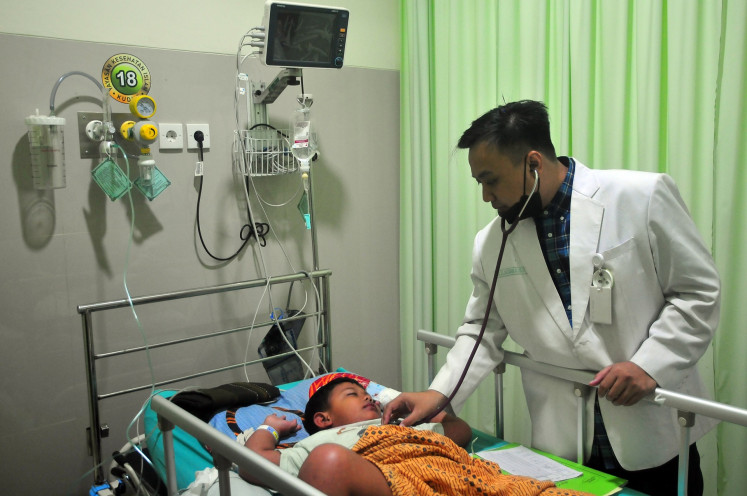Popular Reads
Top Results
Can't find what you're looking for?
View all search resultsPopular Reads
Top Results
Can't find what you're looking for?
View all search resultsWill we ever end violence against women?
In “normal” times, women in Indonesia already experience high levels of violence. The COVID-19 pandemic has further exacerbated the situation.
Change text size
Gift Premium Articles
to Anyone
A
F was raped by a stranger who broke into her house in Bintaro, Tangerang, last year (The Jakarta Post, Aug. 9). Although she filed a report immediately afterward, providing significant evidence, her case has just been processed by the police only after her posts on Instagram went viral in early August.
In the end, the perpetrator was charged under Articles 285 and 365 of the Criminal Code (KUHP) for rape and theft, even though he also allegedly threatened the victim through social media.
The definitions of gender-based violence (GBV) and violence against women (VAW), which encompass different types of violence — from domestic violence and forced marriage, to online violence, to emotional violence — have become more diversified.
However, without comprehensive systematically enforced legislation, survivors often have a hard time reporting such incidents and accessing justice. As a result, impunity for acts of GBV increases and it gets harder to eliminate this scourge.
For the past 12 years, the Annual Report of the National Commission on Violence Against Women (Komnas Perempuan) has recorded a 792 percent or nearly eightfold increase in cases of sexual violence since 2007. Throughout 2019, Komnas Perempuan reported 431,471 cases of VAW, which was 6 percent higher than the previous year. And we know that for every case reported, many more remain hidden—not only in Indonesia but globally.
In “normal” times, women in Indonesia already experience high levels of violence. The COVID-19 pandemic has further exacerbated the situation.
The home is not always a safe space for women. At the outset of the pandemic, the United Nations Population Fund (UNFPA) forecast that there would be up to 31 million more incidents of GBV around the world if lockdowns lasted for six months or longer.
According to a UN Women series of reports on VAW, amid the pandemic, domestic violence has indeed increased worldwide under the cramped and confined living conditions of quarantines and lockdowns, as already tenuous situations intensify, compounded further by tensions and strains stemming from security, health, and financial concerns.
According to Komnas Perempuan, during January-May 2020, the Commission received more than 900 reports of violence against women compared to only 100 per month the previous year.
The Legal Aid Foundation of the Indonesian Women’s Association for Justice (LBH Apik) has also noted a threefold increase in the number of monthly reported cases since the beginning of the pandemic, from 60 to 90 reports. Out of those 90 reports, domestic violence is the largest category with 33 cases, followed by online GBV with 30 cases.
The pandemic situation has also made reporting all the more difficult due to limitations in movement and availability of services. Thus, it is important to reiterate that in reality the numbers are likely higher as many cases go unreported thanks to barriers to access, lack of information regarding reporting mechanisms, sociocultural norms that normalize violence, and stigma that prevents survivors from reporting.
It may sound obvious, but GBV is a genuine health crisis. It negatively affects women’s physical health, including sexual and reproductive health, as well as mental or psychological health — with consequences that include posttraumatic stress disorder, anxiety, and depression.
In July, a woman in Bangkalan, East Java, committed suicide linked to depression after being raped by seven young men (the Post July 9). Already traumatized by the attack, she received threats from the perpetrators afterward. The combination of sexual, verbal and psychological violence prompted her to take her own life.
In GBV cases, women often suffer severe physical injuries, or are even killed. They also face other risks like unintended pregnancy, pregnancy complications and sexually transmitted infections (STIs) and HIV.
When a woman experiences violence, she suffers from multiple layers of injustice, which includes restrictions in mobility, access to health services and education, and opportunities to participate in public life and economic activities. Therefore, VAW not only has negative consequences for women but also for their families, the community, and the nation at large.
Indonesia ratified the Convention of All Forms of Discrimination against Women (CEDAW) 36 years ago.
As part of its international obligation, the Indonesian government will be presenting its eighth periodic review to the CEDAW Committee in Geneva in February 2021, highlighting both progress as well as challenges. Over the years, the government has made sustained efforts to advance women’s rights including among others, enacting the Law on Domestic Violence in 2004 and revising the Marriage Law in 2019 to raise the minimum legal age for girls to marry from 16 to 19 so it is the same as the minimum age for boys.
These are commendable milestones by the government, supported by tireless advocacy from civil society, parliamentarians and other national stakeholders, consistent with Indonesia’s international and national commitments. However, there is much more to be done. A genuinely comprehensive response is required to protect all women and ensure no one is left behind, during these challenging times and beyond.
First, we need to keep essential and integrated services for survivors of violence running and available amid the ongoing pandemic. These include the continuum of health, police, shelter, helplines, psychological, social, and justice services. Ensuring that staffing, funds, and other resources remain adequate to support GBV survivors, even as protocols are strengthened to prevent the virus from spreading should be the current highest priority.
Second, we have to provide a more comprehensive legal framework to ensure survivors of violence are enabled to seek justice, such as the proposed anti-sexual violence bill. The bill broadly regulates acts of sexual violence and recognizes other forms sexual violence not stipulated under the Law on Domestic Violence and the Criminal Code. It allows different types of violence cases, such as cyber GBV and other forms of sexual violence, to be prosecuted. The bill also emphasizes the importance of prevention, protection and recovery, which are critical aspects of a rights-based approach to addressing GBV.
Lastly, we must prioritize survivors of violence as a fundamental part of social protection plans and of investments for medium and longer-term recovery from the COVID-19 crisis.
This is a critical time for women and girls, and urgent action is needed as we are quickly approaching the expiration date for achieving gender equality by 2030 as part of the Sustainable Development Goals.
To convert rhetoric into reality, to truly transform the lives of women and girls, to end GBV and VAW once and for all, we need to ask ourselves what we can do as human beings to speak out and take steps to stem this crisis, as well as chart out a collective vision as to what kind of Indonesia—and world—we want.
For decades Indonesian women, like most women around the world, have been fighting for their rights to social justice, gender equality, and protection from violence. They simply cannot wait any longer.
***
Anjali Sen is United Nations Population Fund Indonesia Representative. Jamshed M. Kazi is UN Women Indonesia Representative.










